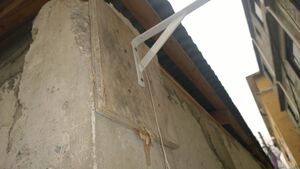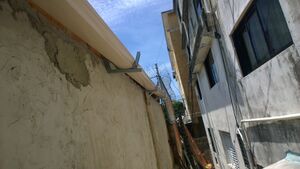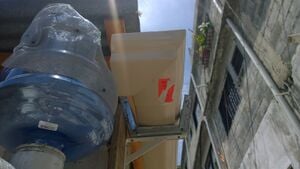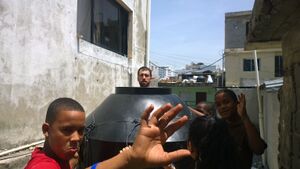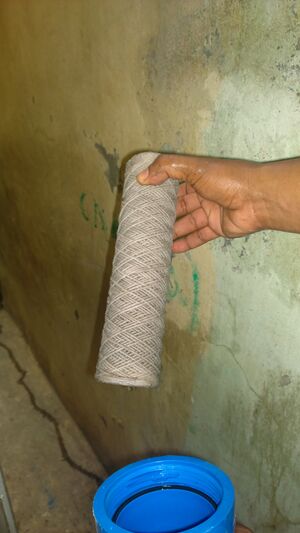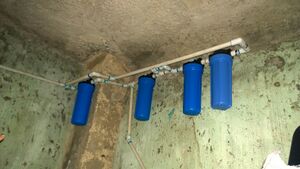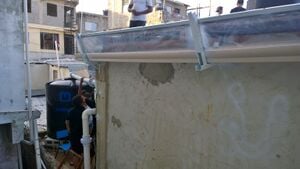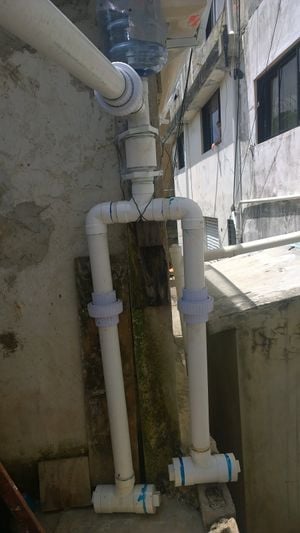
Our objective for the water project for the 2014 Practivistas Dominicana Program in La Yuca is to replace the flat piping system, used to catch rainwater runoff from the roof, with a gutter that will obtain more water.
Our project consisted of analyzing and restoring the existing rainwater catchment system located at La Yuca's school. After repairs were completed, our group expanded the existing system and developed an easily accessible rainwater catchment system that captures, filters, and distributes water that can be used by the local community. It is our goal that available rainwater can be captured efficiently and filtered sufficiently to be used for faucet and toilet purposes, thus providing the community with a cost effective solution to their water shortage.
Background[edit | edit source]
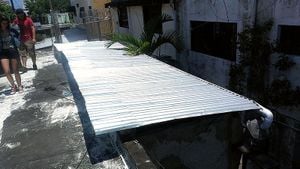
This appropriate technology project is located in Dominican Republic in the La Yuca neighborhood of Santo Domingo. The student team includes 3 students from Cal Poly Humboldt and 4 students from UNIBE and the project is taking place in the month of June, 2014. Concurrent to the project, the Humboldt State students are taking classes at UNIBE in Santo Domingo. The classes are focused on appropriate technology and engineering and are paired with one Spanish class. The system in La Yuca is a rainwater catchment system which has been developed by previous groups over the last three years. The system has not been successful in consistently capturing rainwater and fully utilizing the storage tank attached to the system. The system is attached to the local school and it is a priority of the school to have running water and ideally potable drinking water.
Objective[edit | edit source]
Our objective for the water project for the 2014 Practivistas Dominicana Program in La Yuca is to replace the flat piping system, used to catch rainwater runoff from the roof, with a gutter that will obtain more water. The extra water will be fed into an additional storage tank.
Criteria[edit | edit source]
Below is a table of the criteria used to evaluate project components and make decisions.
| Criteria: | Constraints | Weight |
|---|---|---|
| Aesthetics | Must satisfy aesthetic desires of community. | 5 |
| Cost | Must be within budget constraints of our project. | 8 |
| Locality | Must use materials found within the community of La Yuca. | 3 |
| Durability | The structure must last at least 3 years. | 8 |
| Replicability | Ability to be remade by another or same community. | 8 |
| Safety | Sound structure and mosquito proof. | 9 |
| Potable | Drinkable water, this includes removal of sedimentation, pathogens, and viruses. | 10 |
Literature Review[edit | edit source]
Here is the link for the information we collected to help us understand and review information that will allow us to build the appropriate rainwater catchment system in La Yuca for the 2014 practivistas dominicana program.
Location[edit | edit source]
An Interactive Map for La Yuca. The small cluster of buildings is the rural community where the rainwater catchment is located.
Construction[edit | edit source]
Cost[edit | edit source]
The table below is a summary of the materials and their associated costs which were used for this upgrade of the La Yuca rainwater catchment system. It should be noted that these costs do not represent the entire costs of the rainwater system, for we only upgraded that catchment part of the system and did not build the distribution system throughout the school house. The previous appropedia pages can be referenced for more cost information.
| Material | Quantity | Unit Cost (DOP) | Total Cost (DOP) |
|---|---|---|---|
| PVC Gutter [9 ft.] | 3 | 1600 | 4800 |
| Carbon FIlters | 2 | 250 | 500 |
| Nylon Filters | 2 | 160 | 320 |
| Botellon [5 gal.] | 1 | 195 | 195 |
| Botellon PVC adapter [2] | 1 | 31.12 | 31.12 |
| Bag of screws [25 mm.] | 1 | 42.00 | 42.00 |
| Bag of screws [40mm.] | 1 | 47.00 | 47.00 |
| Outdoor L-brackets | 6 | 75 | 450 |
| Gutter [9 ft] | 3 | 1,963 | 5,890 |
| Plastic mesh for botellon [6 Yrd.] | 1 | 48.12 | 48.12 |
| Metal mesh for gutter [1 Yrd.] | 1 | 289.17 | 289.17 |
| Gutter connector | 2 | 168.00 | 336.20 |
| Tinaco [530 gal] | 1 | 6,700 | 6,700 |
| 90 degree turn for gutter | 1 | 520.10 | 520.10 |
| Total Cost | 20,168.71 | ||
Buy Back[edit | edit source]
This graph illustrates the time it would take for this system to pay itself back in the form of drinkable water. This system will pay itself off in less than a year assuming that the system will catch and use 60% of all rainfall for each given month. Assumed at 30,000 DOP because the system in la yuca was not complete, but rather added to; therefore a complete system would cost roughly 30,000 DOP. The system adds 850 DOP every year to take filter replacement costs into account.
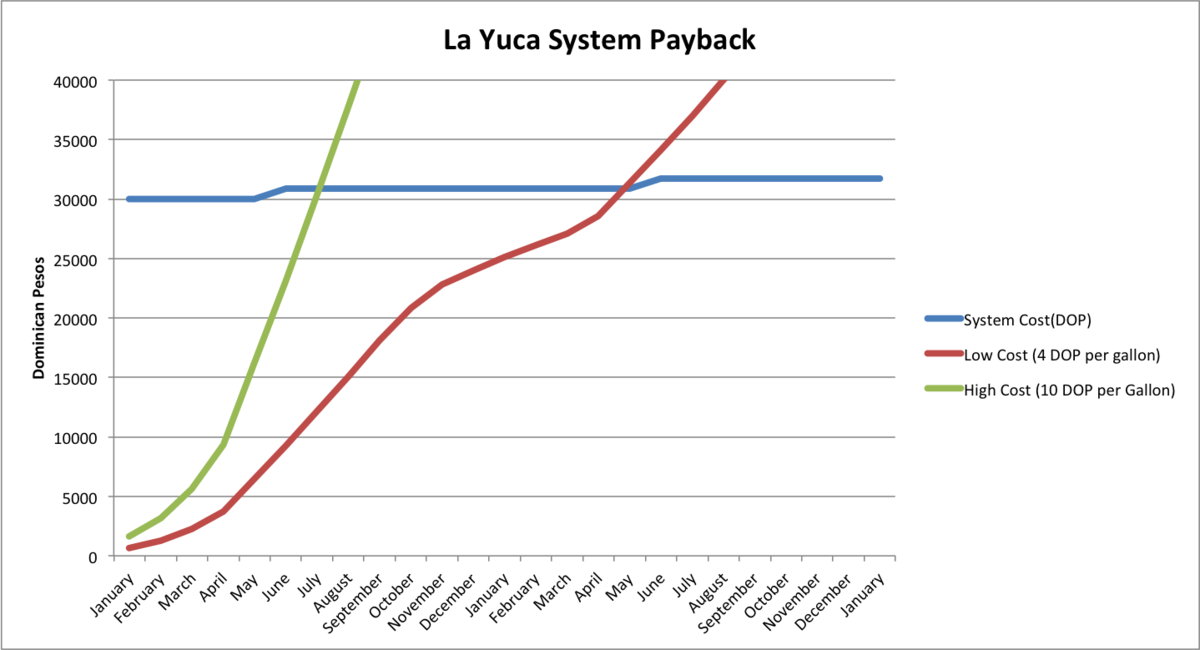
Timeline[edit | edit source]
To ensure productivity, efficiency, and the ability to recreate this project it is essential to propose a course of action. This is done by proposing dates that certain tasks should be completed by; the dates these tasks were actually completed should also be recorded.
| Task: | Date Proposed | Date Done |
|---|---|---|
| Analyze existing rainwater catchment system in an attempt to locate issues | Wednesday June 11, 2014 | Wednesday June 11, 2014 |
| Disassemble existing rainwater catchment system | Thursday June 12, 2014 | Thursday June 12, 2014 |
| Thoroughly clean and disinfect piping that will be used on future rainwater catchment system | Thursday June 12, 2014 | Thursday June 12, 2014 |
| Remove non-functioning gutter/piping system | Thursday June 12, 2014 | Thursday June 12, 2014 |
| Clean and store non-functioning gutter | Thursday June 12, 2014 | Thursday June 12, 2014 |
| Create design to correct existing problems on system | Friday June 13, 2014 | Friday June 13, 2014 |
| Get an advance on our budget in order to have the ability to purchase materials | Friday June 13, 2014 | Friday June 13, 2014 |
| Take necessary measurements in order to perform calculations to prove that design would work | Saturday June 14, 2014 | Saturday June 14, 2014 |
| Visit various ferreterias in order to purchase and transport necessary materials | Saturday June 14, 2014 | Saturday June 14, 2014 |
| Find and rent needed tools, including a power drill that can be used to drill into cement columns | Sunday June 15, 2014 | Monday June 16, 2014 |
| Obtain power tools to drill holes into first flush system, this will allow water to flow out slowly subsequently eliminating mosquito breeding in first flush system | Monday June 16, 2014 | Monday June 16, 2014 |
| Purchase metal needed to secure gutter system to L-brackets | Monday June 16, 2014 | Monday June 16, 2014 |
| Design, create, and install "parrales" to secure gutter system to L-brackets | Monday June 16, 2014 | Monday June 16, 2014 |
| Install new gutter/piping system | Tuesday June 17, 2014 | Tuesday June 17, 2014 |
| Reconstruct intake system (5 gallon botellon) | Tuesday June 17, 2014 | Tuesday June 17, 2014 |
| Reconnect intake system to first flush system | Wednesday June 18, 2014 | Wednesday June 18, 2014 |
| Connect gutter to intake | Wednesday June 18, 2014 | Wednesday June 18, 2014 |
| Run tests to test design, system, and its efficiency | Wednesday June 18, 2014 | Wednesday June 18, 2014 |
| Purchase metal and plastic to construct curtain that will prevent rainwater from spilling over the gutter, eliminating water loss and increasing efficiency | Thursday June 19, 2014 | Thursday June 19, 2014 |
| Purchase additional water storage tank (tinaco) in order to provide more than 5 days of water storage | Thursday June 19, 2014 | Monday June 23, 2014 |
| Install additional tank to existing system | Friday June 20, 2014 | Tuesday June 24, 2014 |
| Reconnect entire rainwater catchment systems | Friday June 20, 2014 | Tuesday June 24, 2014 |
| Flush out entire system with water in order to clean and eliminate any sediments that have been accumulated throughout building process | Saturday June 21, 2014 | Tuesday June 24, 2014 |
| Clean and organize location which houses rainwater catchment system | Saturday June 21, 2014 | Tuesday June 24, 2014 |
| Run tests to test design, system, and its efficiency | Saturday June 21, 2014 | Wednesday June 25, 2014 |
Design[edit | edit source]
The design plan for the rainwater catchment system can be referenced in the model below. The design was done in Google Sketchup and represents the exact system for which our team built off of.
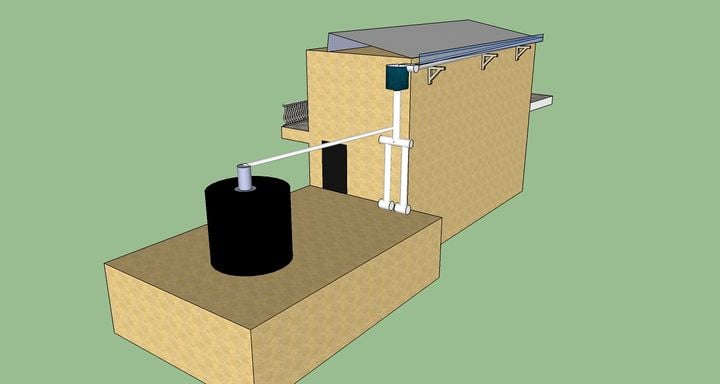
Maintenance[edit | edit source]
This system needs maintenance year-round to ensure that everything works properly and stays clean, especially when taking into account cleanliness of a potable system.
Weekly[edit | edit source]
- Make sure the botellon screen is clean
- Make sure there isn't too much debris in the gutter
- Make sure the first flush isn't clogged and water is able to drain to avoid mosquito breeding. Our team re-poked small holes that were previously clogged in the first flush to make sure water was able to drain out of the system after rain. Make sure the holes are too big that the first flush doesn't fully fill up.
Monthly[edit | edit source]
- Clean the first flush system
- Check for leaks
- Make sure the roof is clean (no debris on the roof)
Yearly/Biyearly[edit | edit source]
- Clean the tinaco
- Buy new filters Biyearly
How We[edit | edit source]
To replace filters refer to this table to find AQUA-TEC.
AQUA-TEC La Julia, Santo Domingo de Guzman 10107 Republica Dominicana info@aquatec.com.do 809-732-1572 Aquatec website
Team[edit | edit source]

